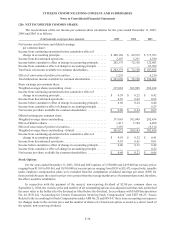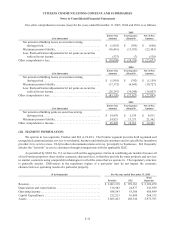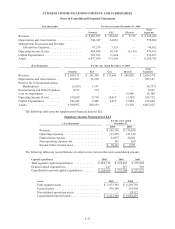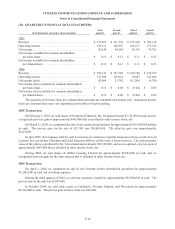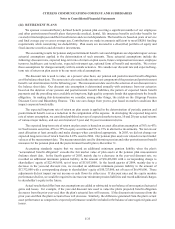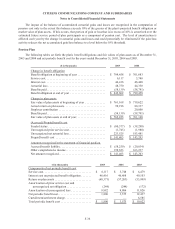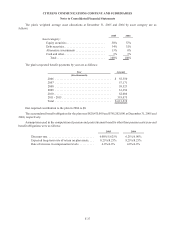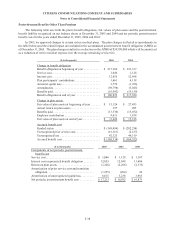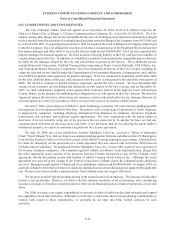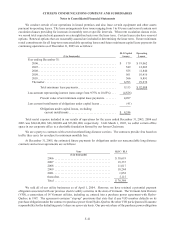Frontier Communications 2005 Annual Report Download - page 89
Download and view the complete annual report
Please find page 89 of the 2005 Frontier Communications annual report below. You can navigate through the pages in the report by either clicking on the pages listed below, or by using the keyword search tool below to find specific information within the annual report.F-40
CITIZENS COMMUNICATIONS COMPANY AND SUBSIDIARIES
Notes to Consolidated Financial Statements
(25) COMMITMENTS AND CONTINGENCIES:
The City of Bangor, Maine, filed suit against us on November 22, 2002, in the U.S. District Court for the
District of Maine (City of Bangor v. Citizens Communications Company, Civ. Action No. 02-183-B-S). The City
alleged, among other things, that we are responsible for the costs of cleaning up environmental contamination alleged
to have resulted from the operation of a manufactured gas plant owned by Bangor Gas Company from 1852-1948 and
by us from 1948-1963. In acquiring the operation in 1948 we acquired the stock of Bangor Gas Company and merged
it into the Company. The City alleged the existence of extensive contamination of the Penobscot River and asserted
that money damages and other relief at issue in the lawsuit could exceed $50,000,000. The City also requested that
punitive damages be assessed against us. We filed an answer denying liability to the City, and asserted a number of
counterclaims against the City. In addition, we identified a number of other potentially responsible parties that may
be liable for the damages alleged by the City and joined them as parties to the lawsuit. These additional parties
include Honeywell Corporation, Guilford Transportation (operating as Maine Central Railroad), UGI Utilities, Inc.
and Centerpoint Energy Resources Corporation. The Court dismissed all but two of the City’s claims, including its
claims for joint and several liability under the Comprehensive Environmental Response, Compensation, and Liability
Act (CERCLA) and the claim against us for punitive damages. Trial was conducted in September and October 2005
for the first (liability) phase of the case, and a decision from the court is anticipated by the end of the first quarter of
2006. We intend to continue to defend ourselves vigorously against the City’s lawsuit. We have demanded that
various of our insurance carriers defend and indemnify us with respect to the City’s lawsuit, and on December 26,
2002, we filed a declaratory judgment action against those insurance carriers in the Superior Court of Penobscot
County, Maine, for the purpose of establishing their obligations to us with respect to the City’s lawsuit. We intend to
vigorously pursue this lawsuit to obtain from our insurance carriers indemnification for any damages that may be
assessed against us in the City’s lawsuit as well as to recover the costs of our defense of that lawsuit.
On June 7, 2004, representatives of Robert A. Katz Technology Licensing, LP, contacted us regarding possible
infringement of several patents held by that firm. The patents cover a wide range of operations in which telephony
is supported by computers, including obtaining information from databases via telephone, interactive telephone
transactions, and customer and technical support applications. We were cooperating with the patent holder to
determine if we are currently using any of the processes that are protected by its patents but have not had any
communication with them on this issue since mid-2004. If we determine that we are utilizing the patent holder’s
intellectual property, we expect to commence negotiations on a license agreement.
On June 24, 2004, one of our subsidiaries, Frontier Subsidiary Telco Inc., received a “Notice of Indemnity
Claim” from Citibank, N.A., that is related to a complaint pending against Citibank and others in the U.S. Bankruptcy
Court for the Southern District of New York as part of the Global Crossing bankruptcy proceeding. Citibank bases
its claim for indemnity on the provisions of a credit agreement that was entered into in October 2000 between
Citibank and our subsidiary. We purchased Frontier Subsidiary Telco, Inc., in June 2001 as part of our acquisition of
the Frontier telephone companies. The complaint against Citibank, for which it seeks indemnification, alleges that
the seller improperly used a portion of the proceeds from the Frontier transaction to pay off the Citibank credit
agreement, thereby defrauding certain debt holders of Global Crossing North America Inc. Although the credit
agreement was paid off at the closing of the Frontier transaction, Citibank claims the indemnification obligation
survives. Damages sought against Citibank and its co-defendants could exceed $1,000,000,000. In August 2004, we
notified Citibank by letter that we believe its claims for indemnification are invalid and are not supported by applicable
law. We have received no further communications from Citibank since our August 2004 letter.
We are party to other legal proceedings arising in the normal course of our business. The outcome of individual
matters is not predictable. However, we believe that the ultimate resolution of all such matters, after considering
insurance coverage, will not have a material adverse effect on our financial position, results of operations, or our cash
flows.
For 2006, we expect our capital expenditures to increase in order to build wireless data networks and expand
the capabilities of our data networks. Although we from time to time make short-term purchasing commitments to
vendors with respect to these expenditures, we generally do not enter into firm, written contracts for such
activities.


